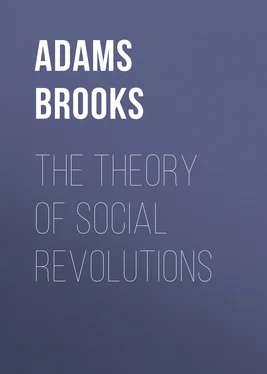Brooks Adams - The Theory of Social Revolutions
Здесь есть возможность читать онлайн «Brooks Adams - The Theory of Social Revolutions» — ознакомительный отрывок электронной книги совершенно бесплатно, а после прочтения отрывка купить полную версию. В некоторых случаях можно слушать аудио, скачать через торрент в формате fb2 и присутствует краткое содержание. Жанр: foreign_edu, Юриспруденция, Политика, на английском языке. Описание произведения, (предисловие) а так же отзывы посетителей доступны на портале библиотеки ЛибКат.
- Название:The Theory of Social Revolutions
- Автор:
- Жанр:
- Год:неизвестен
- ISBN:нет данных
- Рейтинг книги:4 / 5. Голосов: 1
-
Избранное:Добавить в избранное
- Отзывы:
-
Ваша оценка:
- 80
- 1
- 2
- 3
- 4
- 5
The Theory of Social Revolutions: краткое содержание, описание и аннотация
Предлагаем к чтению аннотацию, описание, краткое содержание или предисловие (зависит от того, что написал сам автор книги «The Theory of Social Revolutions»). Если вы не нашли необходимую информацию о книге — напишите в комментариях, мы постараемся отыскать её.
The Theory of Social Revolutions — читать онлайн ознакомительный отрывок
Ниже представлен текст книги, разбитый по страницам. Система сохранения места последней прочитанной страницы, позволяет с удобством читать онлайн бесплатно книгу «The Theory of Social Revolutions», без необходимости каждый раз заново искать на чём Вы остановились. Поставьте закладку, и сможете в любой момент перейти на страницу, на которой закончили чтение.
Интервал:
Закладка:
High among sovereign powers has always ranked the ownership and administration of highways. And it is evident why this should have been so. Movement is life, and the stoppage of movement is death, and the movement of every people flows along its highways. An invader has only to cut the communications of the invaded to paralyze him, as he would paralyze an animal by cutting his arteries or tendons. Accordingly, in all ages and in all lands, down to the nineteenth century, nations even partially centralized have, in their corporate capacity, owned and cared for their highways, either directly or through accountable agents. And they have paid for them by direct taxes, like the Romans, or by tolls levied upon traffic, as many mediaeval governments preferred to do. Either method answers its purpose, provided the government recognizes its responsibility; and no government ever recognized this responsibility more fully than did the autocratic government of ancient Rome. So the absolute régime of eighteenth-century France recognized this responsibility when Louis XVI undertook to remedy the abuse of unequal taxation, for the maintenance of the highways, by abolishing the corvée.
Toward the middle of the nineteenth century, the application, by science, of steam to locomotion, made railways a favorite speculation. Forthwith, private capital acquired these highways, and because of the inelasticity of the old law, treated them as ordinary chattels, to be administered for the profit of the owner exclusively. It is true that railway companies posed as public agents when demanding the power to take private property; but when it came to charging for use of their ways, they claimed to be only private carriers, authorized to bargain as they pleased. Indeed, it grew to be considered a mark of efficient railroad management to extract the largest revenue possible from the people, along the lines of least resistance; that is, by taxing most heavily those individuals and localities which could least resist. And the claim by the railroads that they might do this as a matter of right was long upheld by the courts, 2 2 Fitchburg R.R. v . Gage, 12 Gray 393, and innumerable cases following it.
nor have the judges even yet, after a generation of revolt and of legislation, altogether abandoned this doctrine.
The courts–reluctantly, it is true, and principally at the instigation of the railways themselves, who found the practice unprofitable-have latterly discountenanced discrimination as to persons, but they still uphold discrimination as to localities. 3 3 See the decisions of the Commerce Court on the Long and Short-Haul Clause. Atchison, T.&S.F. By. v . United States, 191 Federal Rep. 856.
Now, among abuses of sovereign power, this is one of the most galling, for of all taxes the transportation tax is perhaps that which is most searching, most insidious, and, when misused, most destructive. The price paid for transportation is not so essential to the public welfare as its equality; for neither persons nor localities can prosper when the necessaries of life cost them more than they cost their competitors. In towns, no cup of water can be drunk, no crust of bread eaten, no garment worn, which has not paid the transportation tax, and the farmer's crops must rot upon his land, if other farmers pay enough less than he to exclude him from markets toward which they all stand in a position otherwise equal. Yet this formidable power has been usurped by private persons who have used it purely selfishly, as no legitimate sovereign could have used it, and by persons who have indignantly denounced all attempts to hold them accountable, as an infringement of their constitutional rights. Obviously, capital cannot assume the position of an irresponsible sovereign, living in a sphere beyond the domain of law, without inviting the fate which has awaited all sovereigns who have denied or abused their trust.
The operation of the New York Clearing-House is another example of the acquisition of sovereign power by irresponsible private persons. Primarily, of course, a clearing-house is an innocent institution occupied with adjusting balances between banks, and has no relation to the volume of the currency. Furthermore, among all highly centralized nations, the regulation of the currency is one of the most jealously guarded of the prerogatives of sovereignty, because all values hinge upon the relation which the volume of the currency bears to the volume of trade. Yet, as everybody knows, in moments of financial panic, the handful of financiers who, directly or indirectly, govern the Clearing-House, have it in their power either to expand or to contract the currency, by issuing or by withdrawing Clearing-House certificates, more effectually perhaps than if they controlled the Treasury of the United States. Nor does this power, vast as it is, at all represent the supremacy which a few bankers enjoy over values, because of their facilities for manipulating the currency and, with the currency, credit; facilities, which are used or abused entirely beyond the reach of the law.
Bankers, at their conventions and through the press, are wont to denounce the American monetary system, and without doubt all that they say, and much more that they do not say, is true; and yet I should suppose that there could be little doubt that American financiers might, after the panic of 1893, and before the administration of Mr. Taft, have obtained from Congress, at most sessions, very reasonable legislation, had they first agreed upon the reforms they demanded, and, secondly, manifested their readiness, as a condition precedent to such reforms, to submit to effective government supervision in those departments of their business which relate to the inflation or depression of values. They have shown little inclination to submit to restraint in these particulars, nor, perhaps, is their reluctance surprising, for the possession by a very small favored class of the unquestioned privilege, whether actually used or not, at recurring intervals, of subjecting the debtor class to such pressure as the creditor may think necessary, in order to force the debtor to surrender his property to the creditor at the creditor's price, is a wonder beside which Aladdin's lamp burns dim.
As I have already remarked, I apprehend that sovereignty is a variable quantity of administrative energy, which, in civilizations which we call advancing, tends to accumulate with a rapidity proportionate to the acceleration of movement. That is to say, the community, as it consolidates, finds it essential to its safety to withdraw, more or less completely, from individuals, and to monopolize, more or less strictly, itself, a great variety of functions. At one stage of civilization the head of the family administers justice, maintains an armed force for war or police, wages war, makes treaties of peace, coins money, and, not infrequently, wears a crown, usually of a form to indicate his importance in a hierarchy. At a later stage of civilization, companies of traders play a great part. Such aggregations of private and irresponsible adventurers have invaded and conquered empires, founded colonies, and administered justice to millions of human beings. In our own time, we have seen the assumption of many of the functions of these and similar private companies by the sovereign. We have seen the East India Company absorbed by the British Parliament; we have seen the railways, and the telephone and the telegraph companies, taken into possession, very generally, by the most progressive governments of the world; and now we have come to the necessity of dealing with the domestic-trade monopoly, because trade has fallen into monopoly through the centralization of capital in a constantly contracting circle of ownership.
Among innumerable kinds of monopolies none have been more troublesome than trade monopolies, especially those which control the price of the necessaries of life; for, so far as I know, no people, approximately free, have long endured such monopolies patiently. Nor could they well have done so without constraint by overpowering physical force, for the possession of a monopoly of a necessary of life by an individual, or by a small privileged class, is tantamount to investing a minority, contemptible alike in numbers and in physical force, with an arbitrary and unlimited power to tax the majority, not for public, but for private purposes. Therefore it has not infrequently happened that persistence in adhering to and in enforcing such monopolies has led, first, to attempts at regulation, and, these failing, to confiscation, and sometimes to the proscription of the owners. An example of such a phenomenon occurs to me which, just now, seems apposite.
Читать дальшеИнтервал:
Закладка:
Похожие книги на «The Theory of Social Revolutions»
Представляем Вашему вниманию похожие книги на «The Theory of Social Revolutions» списком для выбора. Мы отобрали схожую по названию и смыслу литературу в надежде предоставить читателям больше вариантов отыскать новые, интересные, ещё непрочитанные произведения.
Обсуждение, отзывы о книге «The Theory of Social Revolutions» и просто собственные мнения читателей. Оставьте ваши комментарии, напишите, что Вы думаете о произведении, его смысле или главных героях. Укажите что конкретно понравилось, а что нет, и почему Вы так считаете.












